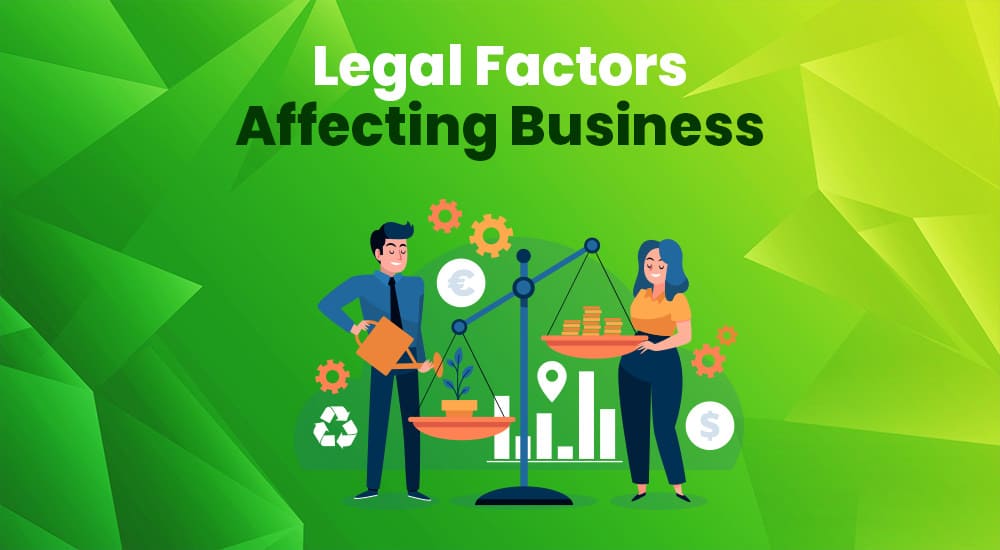There is a popular saying, “The law is meant for man, not man for the law.” This means that laws establish order and provide predictability. Without laws, there would be only chaos and mistrust.
Likewise, the business environment comprises man, money, exchange, and transactions. Every organization needs legal counsel to interpret and protect the legal exposure associated with business actions. Business analysts should not overlook the legal angle of every business initiative to ensure that they are within the confines of the law.
Ignoring legal provisions can cause penalties and fines, disrupting business operations and lowering profitability. Studying fiscal provisions to see opportunities such as tax incentives is important.
Legal factors are external environmental factors and an element of PESTLE analysis. Analysts use PESTLE analysis to find political factors affecting the business and use this info for a SWOT analysis to identify threats and weaknesses of an organization.
PESTLE is an acronym for Political, Economic, Social, Technological, Legal, and Environment.
Legal Factors Affecting Business
Legal factors are related to governmental factors and must be evaluated during strategic planning. They include contracts, torts, Intellectual property (IP), copyright law, tax policies, organizational law, and compliance with work-related laws.
These factors affect businesses. Corporate and business laws determine if selling a product in the market is legal. Businesses must follow the national rules and regulations for marketing, selling, inventory management, etc. Sometimes, these regulations can put restrictions on some business activities.
Different laws apply in different countries, states, and provinces. Business activities and projects must align with the legal framework and regulations, such as consumer rights, privacy, security, advertising standards/laws, equal opportunity, and gender issues, as well as health and safety matters.
Legal factors protect the interests of stakeholders (e.g., customers, employers, employees, sponsors, government bodies, host communities, etc.). Legal guidance is required for most business activities and transactions (e.g., bid evaluation, vendor selection, contract awarding, procurement, and the full project lifecycle). The working procurement document can be a contract or a purchase order, which can be tendered in court against the business as a legal entity.
Examples of Legal Factors
A few common legal factors that can affect a business are as follows:
Consumer Laws
Consumer protection laws prevent unfair, deceptive, and fraudulent business practices using consumer feedback and conducting investigations to substantiate claims. Every business should know consumer law to avoid being sued for violation. Product safety is a key part, especially for consumer-goods type of business.
Discrimination Laws
This law protects employees from being treated unfairly, given opportunities differently, or serviced differently based on gender, religion, race, nationality, etc. Employers and employees should know it because ignorance could be costly.
Labor Laws
These laws applied to employment, remuneration, conditions of service, wages, trade unions, and industrial relations to protect the employees, who are often the weaker party in the employment relationship. Business executives must consider this while drafting HR policies, particularly human resources. Employment law protects employees from dismissal that contravenes government policy.
Health & Safety Laws
Workplace safety is everyone’s responsibility, and OSHA (the Occupational Safety & Health Act) ensures health and safety in the workplace. The law provides employer and employee responsibilities to ensure a safe and healthy working environment.
Data-Protection Policies
This outlines how a company uses, manages, secures, and protects its data to ensure its security. In the modern data-driven economy, increasing cybersecurity threats and data breaches have cost some organizations a lot of money. Therefore, it is wise for companies to make adequate data-protection provisions.
Intellectual-Property Laws
These help protect and enforce the creative rights of inventions, artworks, brands, and music (e.g., patents, copyright, trademarks, trade secrets, etc.). These protect property owners against infringement uses.
Customs Laws
Customs laws affect businesses that deal with the import and export of goods. These include quotas, tariffs, and compliance with international trade agreements. Businesses must follow the rules and regulations of the countries that import and export the products.
Real-Life Examples of Legal Factors that Affect Business
- Nigeria’s Petroleum Industry Act, signed into law in 2021, improved the business climate for the oil and gas industry. Several fiscal and regulatory provisions (e.g., tax holidays, streamlined taxes, etc.) were made to encourage investors, protect host communities, generate more stakeholder revenue, and promote economic growth.
- In 2018, a group of Facebook users alleged that the social-media giant had illegally shared user data with a third-party analysis firm based in the UK. This cost Facebook a large fine and a reactionary drop in the company’s share price by over 100 billion USD. This is a cautionary tale that data-protection measures should not be undermined in a digital-driven world.
- Tesla allegedly forced employees to sign non-disclosure agreements regarding the facility’s working conditions and safety issues. At face value, this violates workers’ rights, and business executives should ensure that employee relations are fair, as the company’s image or reputation can be adversely affected if they are not.
- The telecommunications company Vodafone was sued and fined 3.7 million pounds for taking money from 10,452 pay-as-you-go customers without providing a service in return. The company failed to credit customers’ accounts after they paid to top up their mobile-phone credit following the introduction of its new billing system.
Conclusion
Prevention is better than a cure. Legal issues (e.g., failure to abide by terms, manual mistakes, and execution delays) can cause legal action and lead to financial, relationship, and reputational losses for the company. Often, unfairness results in legal issues that can negatively affect the business’ brand value.
Therefore, service providers and consumer goods producers must consider their vital roles and ensure that their activities, processes, and systems treat their customers fairly and in good faith.
References
https://www.britannica.com/topic/labour-law
https://www.upcounsel.com/discrimination-laws
https://www.reuters.com/article/us-tesla-labor-idUSKCN1BC3FK
